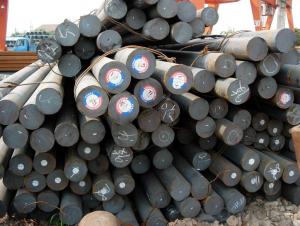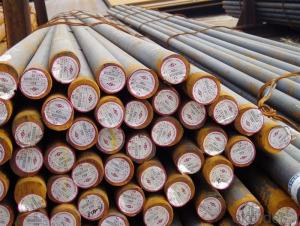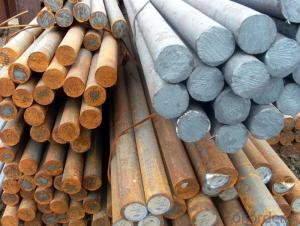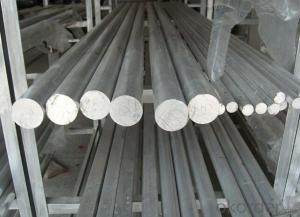42CrMo4 Alloy Steel Round Bars Hot Rolled Bars
- Loading Port:
- Tianjin
- Payment Terms:
- TT OR LC
- Min Order Qty:
- 25 m.t.
- Supply Capability:
- 50000 m.t./month
OKorder Service Pledge
OKorder Financial Service
You Might Also Like
Item specifice
42CrMo4 Alloy Steel Round Bars Hot Rolled Bars
Product Description:
1. Sizes: Diameter: 16mm-300mm; Length: 6m, 9m, 12m
2. Grade: 42CrMo, 4140,42CrMov4
3. Invoicing on theoretical weight or actual weight as customer’s request
4. Shape: Round bar, solid bar of steel with circular section
5. Technique: Hot rolled, forged, cold rolled
Specification:
Material | 42CrMo4 | Round bar | Dia(mm) | 16-600 |
Process | EAF + LF + VD + Forged + Heat Treatment (optional) | Length (mm) | Max 12000 | |
Heat treatment | Normalized / Annealed / Quenched / tempered | Flat bar | Thickness(mm) | 8-500 |
Delivery condition | Hot forged +Rough machined (black surface after Q/T)+ Turned (optional) | Width(mm) | 70-200 | |
Test | Ultrasonic test according to SEP 1921-84 D/d | Length (mm) | Max 12000 |
Chemical Composition:
C | Si | Mn | Cr | Ni | Cu |
0.38~0.45 | 0.17~0.37 | 0.50~0.80 | 0.9-1.2 | ≤0.030 | ≤0.030 |
Packing and Delivery:
Packing in bundle with steel strips and shipped by break bulk vessel or container (depend on target market and different ports)
Delivery Detail: Approx.45 days
Usage and Applications:
1. Steel round bar is used in a large number of architectural and engineering structures. Or it can be used in construction of plants for the production of steel house frames, high-voltage transmission towers, bridges, vehicles, boilers, containers, ships, etc.
2. And we can use this kind of product on the performance of the mechanical parts if the demand is not very high.
3. Some especial material steel round bar can be used for main shaft of steamer, hummer shank, with big section and supper force.
Product Show:
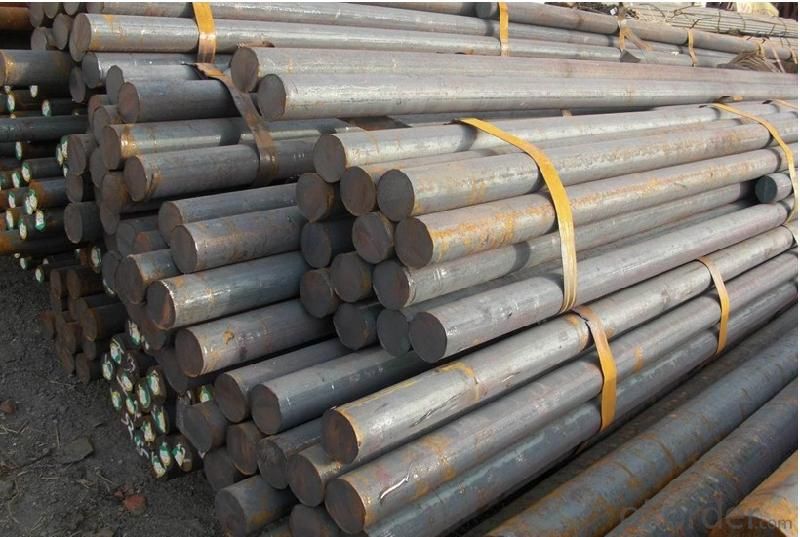
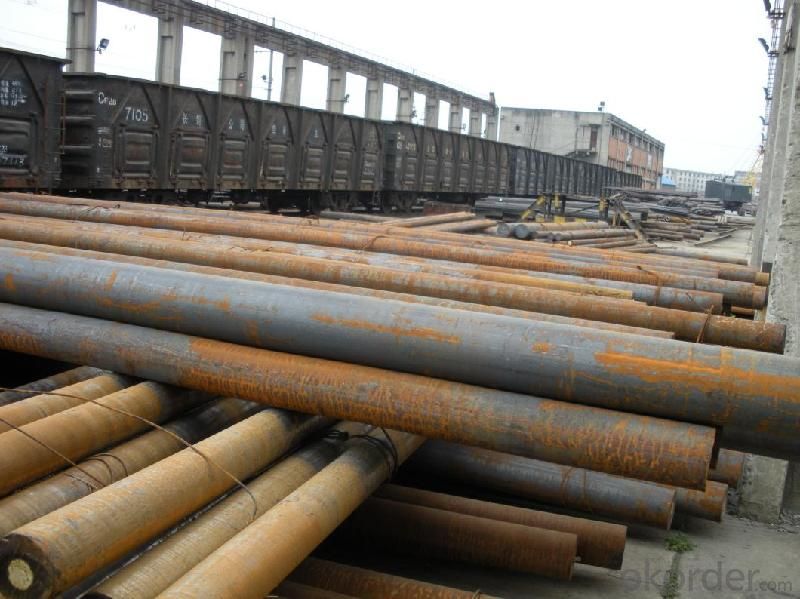
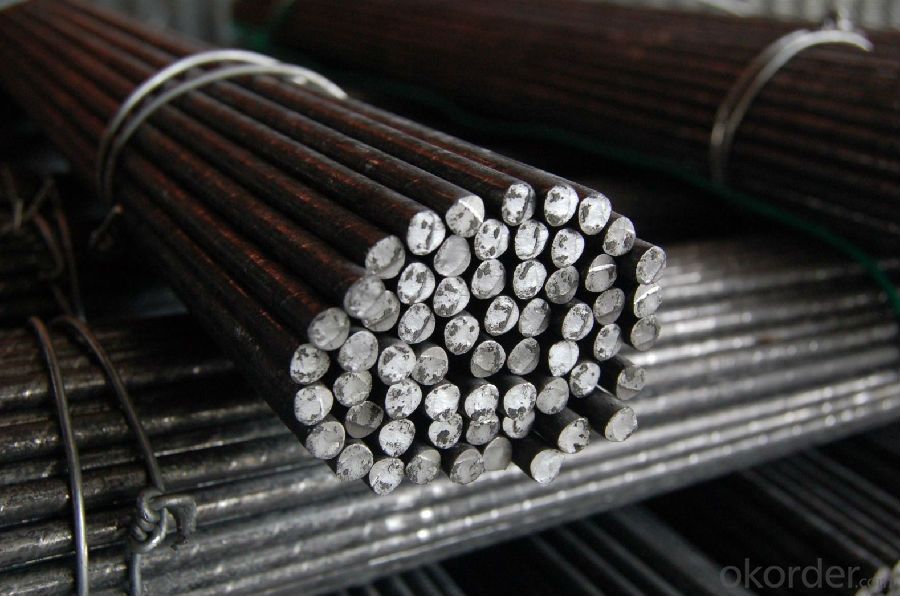
- Q:How does special steel perform in automotive applications?
- Special steel performs exceptionally well in automotive applications due to its unique properties and characteristics. It offers superior strength, durability, and resistance to wear and corrosion, making it highly suitable for critical components such as engine parts, chassis, and suspension systems. Special steel also enables the production of lightweight designs, enhancing fuel efficiency and reducing emissions. Additionally, its high heat resistance and thermal conductivity contribute to improved performance and safety in extreme conditions. Overall, the use of special steel in automotive applications ensures enhanced reliability, performance, and longevity of vehicles.
- Q:What are the different methods of surface electropolishing for special steel?
- Special steel can undergo surface electropolishing using various methods, each with its unique benefits and applications. 1. Immersion Electropolishing: To achieve a smooth and polished finish, the special steel components are immersed in an electrolyte bath, and a direct current is passed through the solution. This method is ideal for large and complex parts, offering uniform surface improvement on all exposed areas. 2. Electrolytic Electropolishing: By applying a direct current directly to the surface of the special steel component using an electrode, the surface dissolves, resulting in a reflective and smooth finish. This technique allows precise control over the process and is suitable for smaller or intricate parts, targeting specific areas that require improvement. 3. Reverse Pulse Electropolishing: A combination of direct and reverse current pulses is utilized to achieve an exceptional surface finish. The reverse current pulses reduce surface roughness and eliminate embedded particles or contaminants. This method is especially beneficial for special steel components that require enhanced corrosion resistance and improved cleanliness. 4. Magnetic Field-Assisted Electropolishing: Applying a magnetic field to the electropolishing process can enhance the polishing rate and surface finish. The alignment of the electrical current by the magnetic field improves material removal, resulting in a smoother and more uniform surface. This method is preferred for difficult-to-polish special steels or those with complex geometries. 5. Flow-Assisted Electropolishing: By using a flowing electrolyte solution, the electropolishing process is enhanced. The flowing solution aids in removing dissolved material from the surface and prevents the formation of gas bubbles, resulting in a more efficient and smoother polishing. This method is suitable for large or flat special steel components requiring a high-quality surface finish. In conclusion, the choice of the appropriate method for surface electropolishing of special steel depends on specific component requirements, such as size, geometry, and desired surface finish. Each method has its advantages and considerations, and seeking guidance from an experienced electropolishing specialist is advisable to determine the most suitable approach.
- Q:How does special steel contribute to the chemical resistance of products?
- Special steel, also known as stainless steel, contributes significantly to the chemical resistance of products due to its unique composition and properties. These steels contain a high percentage of chromium, which forms a thin, passive oxide layer on the surface of the steel. This oxide layer acts as a protective barrier, preventing corrosive substances from coming into direct contact with the steel and causing chemical reactions. The chromium in special steel forms a stable oxide layer that is highly resistant to corrosion, even in harsh chemical environments. This oxide layer is self-repairing, meaning that if it is damaged or scratched, it will quickly reform and continue to protect the steel. Additionally, the presence of other alloying elements such as nickel and molybdenum further enhances the chemical resistance of special steel. The chemical resistance of special steel extends to a wide range of corrosive substances, including acids, alkalis, and salts. This makes it highly suitable for applications in various industries such as chemical processing, pharmaceuticals, food processing, and marine environments. By using special steel in the manufacturing of products, the risk of chemical degradation and corrosion is significantly reduced. This leads to increased product lifespan, improved performance, and reduced maintenance costs. Furthermore, it ensures that the integrity and safety of the products are maintained, as chemical resistance is crucial in preventing leaks, contamination, and structural failures. In summary, special steel contributes to the chemical resistance of products by forming a protective oxide layer on its surface, which shields it from corrosive substances. Its unique composition and properties make it highly resistant to chemical degradation, ensuring the longevity and reliability of products in various industrial applications.
- Q:What are the different corrosion-resistant special steel alloys?
- Some examples of corrosion-resistant special steel alloys include stainless steel, which contains chromium and nickel for improved resistance to corrosion; duplex stainless steel, which has a combination of austenite and ferrite structures for enhanced corrosion resistance; and super duplex stainless steel, which has even higher levels of chromium, molybdenum, and nitrogen for superior corrosion resistance in harsh environments. Other corrosion-resistant alloys may include nickel-based alloys, titanium alloys, and aluminum alloys.
- Q:What are the different quenching techniques used for special steel?
- There are several quenching techniques used for special steel, including oil quenching, water quenching, polymer quenching, and air quenching. Each technique has its own advantages and disadvantages and is chosen based on the specific requirements of the steel being quenched. Oil quenching provides a slower cooling rate, resulting in reduced risk of cracking and distortion. Water quenching, on the other hand, provides a rapid cooling rate, making it suitable for achieving maximum hardness. Polymer quenching offers a controlled cooling rate, allowing for the desired balance between hardness and toughness. Air quenching is the slowest cooling method, providing the least hardness but also the least risk of distortion. The choice of quenching technique depends on the desired properties of the special steel and the specific application it will be used for.
- Q:What properties make special steel unique?
- Special steel is unique due to its exceptional properties such as high strength, excellent corrosion resistance, superior heat resistance, and remarkable wear resistance. It possesses a combination of various alloying elements like chromium, nickel, molybdenum, and vanadium, which enhance its mechanical properties and make it suitable for a wide range of applications in industries such as automotive, aerospace, and construction. Additionally, special steel can be tailored through precise manufacturing processes to exhibit specific characteristics, making it a versatile and highly sought-after material.
- Q:What are the main advantages of using special steel in the mining industry?
- The main advantages of using special steel in the mining industry are its exceptional strength, durability, and resistance to wear and corrosion. This allows for the construction of heavy-duty equipment and machinery that can withstand the harsh and demanding conditions of mining operations. Special steel also has the ability to retain its properties at high temperatures, making it suitable for applications such as drilling and cutting through tough materials. Additionally, it offers increased safety by minimizing the risk of equipment failure, ensuring a more efficient and productive mining process.
- Q:How does special steel perform in high-temperature corrosion resistance?
- Special steel is renowned for its outstanding performance in resisting corrosion at high temperatures. It is specifically crafted to endure harsh circumstances and maintain its integrity even when exposed to elevated temperatures. The composition of special steel incorporates various alloying elements, including chromium, nickel, molybdenum, and others, which enhance its resistance to corrosion in high-temperature settings. When subjected to high temperatures, numerous materials have a tendency to oxidize or react with the surrounding environment, resulting in corrosion and deterioration. However, special steel develops a protective oxide layer on its surface, serving as a barrier against corrosive elements. This oxide layer, primarily composed of chromium, remains stable and possesses self-repairing properties, effectively preventing further corrosion and upholding the structural integrity of the steel. Moreover, the incorporation of alloying elements like molybdenum enhances the steel's ability to resist pitting and crevice corrosion, which are commonly observed in high-temperature environments. Special steel also exhibits exceptional mechanical properties even at elevated temperatures, ensuring structural stability and preventing deformation or failure under stress. Additionally, special steel is frequently subjected to heat treatment to bolster its resistance to corrosion at high temperatures. Heat treatment processes such as annealing, tempering, or quenching and tempering optimize the steel's microstructure and mechanical properties, rendering it more impervious to corrosion in extreme conditions. In conclusion, special steel excels in its ability to resist corrosion at high temperatures due to its distinct composition, protective oxide layer, and heat treatment procedures. It is a dependable and long-lasting material choice for applications that involve exposure to elevated temperatures and corrosive environments, such as in chemical processing plants, power generation facilities, or oil and gas refineries.
- Q:How does special steel perform in terms of thermal conductivity?
- Special steel typically has lower thermal conductivity compared to other materials such as copper or aluminum. However, it can still conduct heat to a certain extent, making it suitable for applications where controlled heat transfer is required, such as in engine components or heat exchangers.
- Q:What is the role of special steel in the construction industry?
- Special steel plays a crucial role in the construction industry as it provides strength, durability, and resistance to various environmental factors. It is commonly used in the construction of high-rise buildings, bridges, and infrastructure projects. Special steel's unique properties, such as high tensile strength, corrosion resistance, and heat resistance, make it suitable for critical applications where standard steel may not suffice. It ensures the structural integrity and safety of construction projects, making it an essential material in the industry.
1. Manufacturer Overview |
|
|---|---|
| Location | |
| Year Established | |
| Annual Output Value | |
| Main Markets | |
| Company Certifications | |
2. Manufacturer Certificates |
|
|---|---|
| a) Certification Name | |
| Range | |
| Reference | |
| Validity Period | |
3. Manufacturer Capability |
|
|---|---|
| a)Trade Capacity | |
| Nearest Port | |
| Export Percentage | |
| No.of Employees in Trade Department | |
| Language Spoken: | |
| b)Factory Information | |
| Factory Size: | |
| No. of Production Lines | |
| Contract Manufacturing | |
| Product Price Range | |
Send your message to us
42CrMo4 Alloy Steel Round Bars Hot Rolled Bars
- Loading Port:
- Tianjin
- Payment Terms:
- TT OR LC
- Min Order Qty:
- 25 m.t.
- Supply Capability:
- 50000 m.t./month
OKorder Service Pledge
OKorder Financial Service
Similar products
New products
Hot products
Hot Searches
Related keywords
